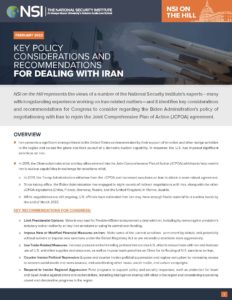 NSI on the Hill represents the views of a number of the National Security Institute’s experts—many with longstanding experience working on national security-related matters—and it identifies key considerations and recommendations for Congress to consider regarding the toughest foreign policy challenges facing U.S. policymakers today.
NSI on the Hill represents the views of a number of the National Security Institute’s experts—many with longstanding experience working on national security-related matters—and it identifies key considerations and recommendations for Congress to consider regarding the toughest foreign policy challenges facing U.S. policymakers today.
Overview
- Iran presents a significant strategic threat to the United States as demonstrated by their support of terrorism and other malign activities in the region and across the globe and their pursuit of a domestic nuclear capability. In response, the U.S. has imposed significant sanctions on Iran.
- In 2015, the Obama Administration and key allies entered into the Joint Comprehensive Plan of Action (JCPOA) with Iran to help restrict Iran’s nuclear capabilities in exchange for sanctions relief.
-
- In 2018, the Trump Administration withdrew from the JCPOA and increased sanctions on Iran in an effort to obtain a more robust agreement.
-
- Upon taking office in 2021, the Biden Administration has indicated it intends to reenter the JCPOA and has begun negotitations through intermediares in Austria.
Recommendations for Congress
- Limit Presidential Options: Make it very hard for President Biden to implement a deal with Iran, including by removing the president’s statutory waiver authority on key Iran sanctions or using its control over funding.
- Impose New or Modified Financial Measures on Iran: Make some of the current sanctions permanent by statute and potentially without waivers or impose new sanctions under the Global Magnitsky Act or use secondary sanctions more aggressively.
- Use Trade-Related Measures: Increase pressure on Iran’s trading partners that are also U.S. allies to reduce trade with Iran and increase use of U.S. and allied supplies and resources, as well as impose trade penalites on China for its flouting of U.S. sanctions on Iran.
- Counter Iranian Political Repression: Expose and counter Iranian political suppression and regime corruption by increasing access to western social media and news sources, and coordinating other music, social media, and culture campaigns.
- Respond to Iranian Regional Aggression: Fund programs to support policy and security responses, such as protection for Israel and Saudi Arabia against drone and rocket strikes, restarting intelligence sharing with allies in the region and considering expanding covert and clandestine programs in the region.
Read the full report here.
